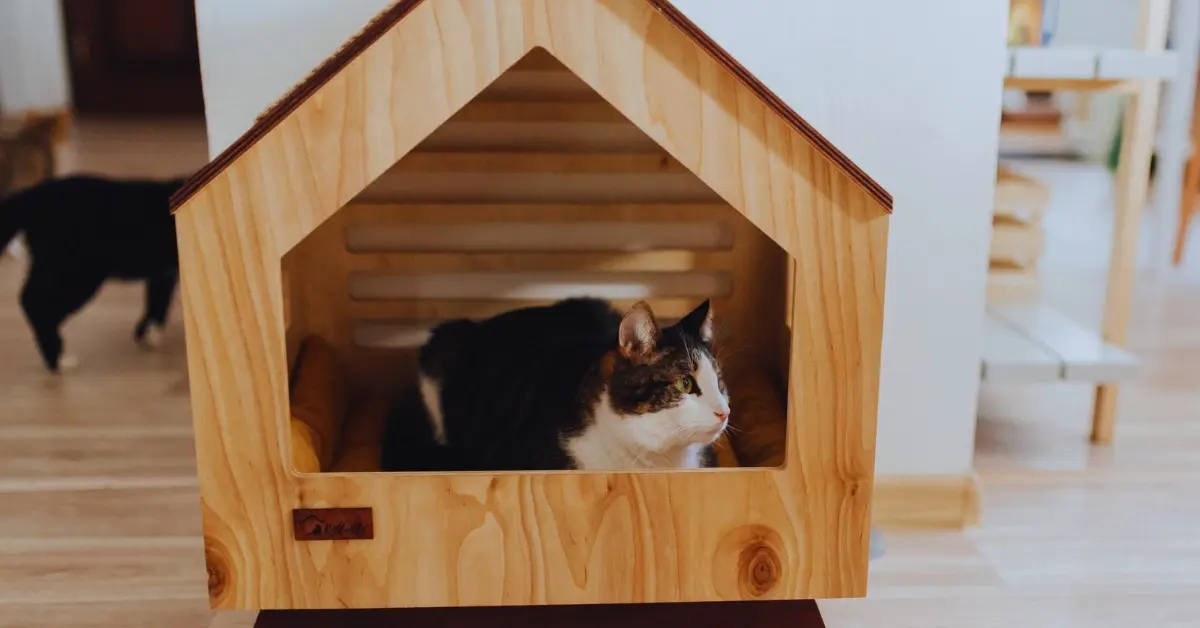Cats can be good for apartments as they are low-maintenance pets that do well in small living spaces. However, the decision to have a cat in an apartment depends on various factors, including the cat’s personality and the apartment’s restrictions.
Living with cats in an apartment can be a convenient and happy experience for the owner and the cat alike. Cats are independent animals that do not require any outdoor space to roam around. Therefore, they can adapt well to living in apartments.
However, before adopting a cat, the apartment owner must ensure that they can provide enough space, litter boxes, and scratching posts for the cat. Additionally, some apartments may have breed or size restrictions on pets, and the owner must adhere to those rules.
It is also essential to understand the cat’s personality and ensure that it is well-suited for apartment living. By taking these factors into consideration, apartment owners can make an informed decision on adopting a cat as a pet.

The Pros And Cons Of Owning A Cat In An Apartment
Bringing a furry feline friend into your apartment can be both exciting and daunting.
While cats are undoubtedly adorable, they can present some challenges for apartment owners.
We’ll explore the pros and cons of owning a cat in an apartment so that you can make an informed decision.
The Joys Of Owning A Cat In An Apartment
- Cats are independent animals, so apartment living can be a perfect match. They don’t require a lot of space and are happy to entertain themselves.
- Unlike dogs, cats are low-maintenance pets that don’t need to be taken outside for walks or potty breaks. They can use a litter box instead.
- Cats are notorious for their playful and entertaining nature, so they can provide a lot of joy and entertainment. Plus, they can be great company when you’re home alone.
The Drawbacks Of Owning A Cat In An Apartment
- One of the major drawbacks of owning a cat in an apartment is the lack of space. Cats like to explore and play, so it’s essential to provide them with enough room. Without sufficient space, cats can become bored and stressed.
- Cats are known for their sharp claws, which can be a significant issue in an apartment. They may scratch or damage furniture, carpets, or walls, requiring repairs or replacements.
- Cats can also be noisy and cause disturbances to your neighbours, especially if they meow loudly or run around at night.
Overall, owning a cat in an apartment has its pros and cons. While they can be low-maintenance pets, cats require enough room to move and play.
Additionally, their potential for destructive behaviour and noise can be a concern. It’s essential to weigh the pros and cons before deciding to bring a cat into your home.
Lifestyle Considerations For Owning A Cat In An Apartment

Assessing Space Requirements For Cats In Small Apartments
Before deciding to bring a feline friend into your apartment, it’s essential to assess whether you have enough space and resources to accommodate them comfortably.
Here are a few things to keep in mind:
- Cats need vertical space to climb, scratch, and play. Consider adding shelves or a tall cat tree to give them more room to explore.
- Make sure your apartment has an area where your cat can do their business, whether that’s a litter box or a designated spot on a balcony. Keep in mind that litter boxes can take up valuable floor space.
- Cats also need space to hide, sleep, and relax. Consider providing a cosy bed or hiding spot for your feline friend.
- Don’t forget to factor in space for yourself and any roommates or guests. Your cat will need plenty of space to run and play without getting underfoot.
Challenges Of Living With Cats In Shared Spaces
Living with a cat in an apartment building or shared living situation can present some unique challenges. Here are a few things to keep in mind:
- Some people may be allergic to cats, so it’s important to be respectful of your neighbours’ needs. Consider keeping your cat contained in your apartment and investing in an air purifier to reduce dander and allergens.
- Cats can be noisy at night, especially if they’re bored or lonely. Consider giving your cat plenty of toys and playtime during the day to reduce the likelihood of excessive meowing or scratching at night.
- If you have a balcony or open windows, make sure they are screened or secured to prevent your cat from escaping or falling.
Strategies For Integrating Cats Into Small Apartment Living
Integrating a cat into a small apartment can be challenging, but with a little creativity, you can make it work. Here are a few strategies to consider:
- Set aside one room or area as your cat’s designated space. This can be a great way to provide your cat with a sense of security and give them their own space.
- Provide plenty of interactive toys and playtime to keep your cat engaged and entertained. Puzzle feeders, wand toys, and scratching posts can all be great options.
- Consider crate training your cat to give them a secure space to retreat to when you’re not home. Make sure the crate is large enough for your cat to move around comfortably and leave plenty of toys and comfortable bedding inside.
- Finally, make sure your cat has access to plenty of fresh water and high-quality food to keep them healthy and happy. Consider investing in a water fountain or automatic feeder to make feeding time more convenient.
Benefits Of Owning A Cat In An Apartment

Cats Make Great Apartment Companions
Cats are one of the best pets for apartment dwellers. Cats have a calm demeanour, which makes them perfect for apartment living.
Here are some reasons why cats make great apartment companions:
- Cats are independent pets and don’t require a lot of attention. They usually have a laid-back attitude and won’t mind their owners’ busy schedules.
- They are clean creatures that groom themselves daily, which makes them less messy than other pets like dogs.
- They don’t require a lot of space, and a small apartment is enough for them. They can entertain themselves indoors and don’t need a backyard or open spaces like dogs.
- Cats are quiet pets and won’t disturb your neighbours with loud barks or howls.
Helping Cats Feel At Home In Apartment Settings
Cats may take a little extra effort to flourish in an apartment, but it’s well worth it.
If you’re bringing home a cat to an apartment, here are some tips to help your feline feel at home:
- Provide proper litter boxes and place them in easy-to-access locations.
- Create cozy spaces, such as cat beds or towers and dedicate one room just for your feline that can be its safe haven.
- Offer plenty of scratching opportunities to keep your cat’s claws healthy and your furniture scratch-free.
- You can offer some toys that climb and explore, such as puzzle toys or a climbing tree.
Positive Impact Of Cat Ownership On Apartment Living Environment
Cat ownership has many benefits for those living in apartments, including:
- Reducing stress: Studies show that interacting with cats can lower stress levels and help you relax after a long day at work.
- Improving air quality: Cats are low-allergen pets, making them ideal for those with allergies or asthma. Keeping a cat also ensures the apartment air is constantly being cleaned of dander and dust.
- Providing companionship: Little furry friends can provide comfort and support during lonely or difficult times making your apartment feel more like a home.
- Lowering anxiety levels: The calming effects of cat purrs are well known, but did you know that medical research has demonstrated that owning cats can lower anxiety levels and improve your mental health? An apartment with a feline friend is a happy one!
Cats are perfect apartment companions that bring a positive impact on the well-being of the apartment inhabitants.
By following some of the tips mentioned above, cat owners can easily make their homes welcoming places for their cats, which in turn leads to a happier life for both pet and owner.
Frequently Asked Questions For Are Cats Bad For Apartments
Are Cats Suitable For Living In Apartments?
Yes, cats can be great companions for apartment dwellers as long as their needs are met.
Do Cats Cause Damage To Apartments?
Cats may scratch furniture if their scratching needs are not met, but damage can be prevented with proper training and supplies.
Will Cats Disturb My Neighbors In An Apartment Building?
Cats are generally quiet animals, but excessive meowing or scratching can be addressed with behaviour modification techniques.
How Can I Make My Apartment Cat-Friendly?
Provide your cat with plenty of vertical space, scratching posts, toys, and access to natural light and fresh air to make your home a comfortable and stimulating environment.
Conclusion
After examining all the factors involved, it’s safe to conclude that cats can be wonderful apartment companions if you take the necessary steps to make it work.
Before bringing a cat into an apartment, it’s important to consider factors such as space, noise level, and potential damage to the property.
It’s also crucial to engage in activities that keep your cat active and stimulated, such as providing scratching posts and toys.
Moreover, regular vet check-ups and cleaning routines will help to keep your apartment clean and odour-free.
In terms of the benefits, cats are low-maintenance pets that can provide affection, entertainment, and stress relief.
Ultimately, with a little effort and care, cats can be great additions to apartment living.
So, don’t let the myth of cats in apartments hold you back – they can happily coexist with you if you take the proper approach.
